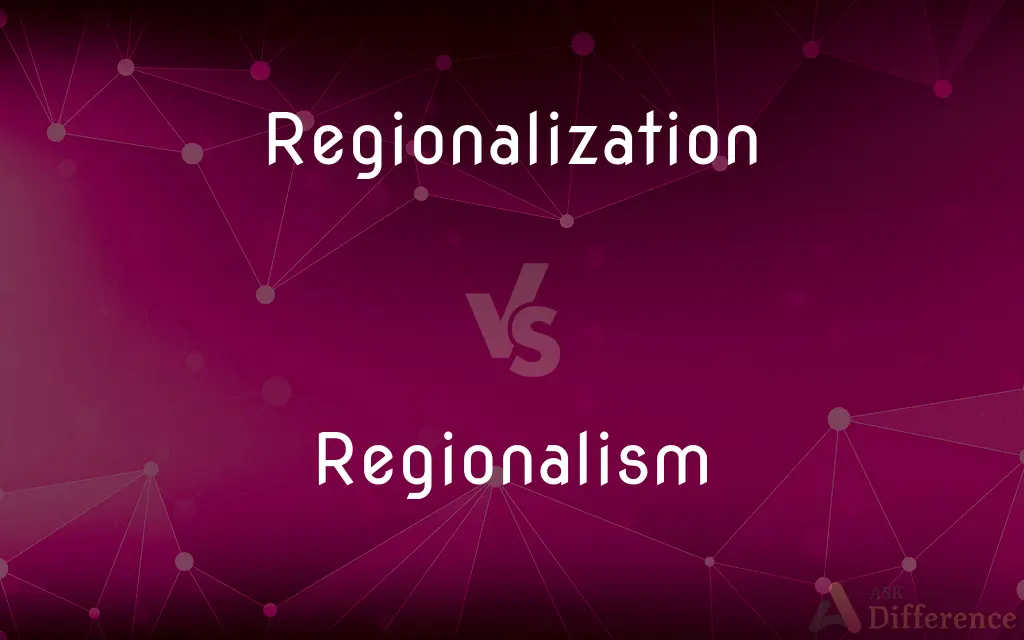Regionalization vs. Regionalism — What's the Difference?
By Tayyaba Rehman & Maham Liaqat — Updated on April 27, 2024
"Regionalization" refers to the process of dividing an area into smaller regions, often for administrative purposes, while "regionalism" denotes political or economic policies favoring certain regions, sometimes leading to preferential treatment.

Difference Between Regionalization and Regionalism
Table of Contents
ADVERTISEMENT
Key Differences
"Regionalization" involves the division of a larger geographic or administrative area into smaller, manageable regions, focusing on improving governance or service delivery. Whereas "regionalism" typically refers to a political or economic ideology or policy that emphasizes the interests of a particular region, often at the expense of national unity.
The process of regionalization is usually driven by practical considerations such as administrative efficiency, economic development, or cultural representation. On the other hand, regionalism can emerge from feelings of marginalization or unique cultural identity, leading to advocacy for increased regional autonomy or resources.
Regionalization can be seen in efforts to decentralize government functions to better address local needs and conditions, which can help improve local governance and resource allocation. Whereas regionalism might manifest in regional parties or movements pushing for greater local control or highlighting regional issues in national politics.
In terms of outcomes, regionalization often aims to balance development and bring services closer to the population, thus potentially reducing disparities between regions. Conversely, regionalism, especially when it intensifies, can sometimes lead to divisions and conflicts within a country, as regions vie for more power or resources.
Comparison Chart
Definition
Dividing into smaller regions
Political/economic favoritism toward regions
ADVERTISEMENT
Purpose
Improve governance and service delivery
Promote regional interests
Drivers
Administrative efficiency, local needs
Cultural identity, marginalization
Typical Manifestations
Decentralization, local governance improvements
Regional parties, autonomy movements
Potential Outcomes
Better local services, reduced regional disparities
Increased regional autonomy, potential conflicts
Compare with Definitions
Regionalization
Efficiency improvement.
Regionalization is aimed at making public administration more efficient.
Regionalism
Political advocacy.
Regionalism often involves advocating for the interests of a particular region.
Regionalization
Administrative division.
Regionalization often leads to the creation of new administrative units.
Regionalism
Economic policies.
Regionalism can result in policies that favor specific areas economically.
Regionalization
Decentralization.
Regionalization is a form of decentralization aimed at empowering local authorities.
Regionalism
Preferential treatment.
Regionalism sometimes results in preferential treatment for certain regions.
Regionalization
Local adaptation.
Regionalization allows laws and policies to be adapted to local conditions.
Regionalism
Cultural identity.
Regionalism is rooted in a strong sense of cultural identity.
Regionalization
Service delivery.
Through regionalization, healthcare and education services can reach remote areas.
Regionalism
Autonomy movement.
Regionalism may lead to movements demanding more regional autonomy.
Regionalization
To divide into regions, especially for administrative purposes.
Regionalism
Political division of an area into partially autonomous regions.
Regionalization
An act or process of regionalizing.
Regionalism
Advocacy of such a political system.
Regionalism
Loyalty to the interests of a particular region.
Regionalism
A feature, such as an expression, a pronunciation, or a custom, that is characteristic of a geographic area.
Regionalism
The use of regional characteristics, as of locale, custom, or speech, in literature or art.
Regionalism
A policy whereby the interests of a nation in world affairs are defined in terms of particular countries or regions.
Regionalism
Affection, often excessive, for one's own region and to everything related to it.
Regionalism
(politics) The belief that most or nearly all political power should be decentralized to regional governments.
Regionalism
A word or phrase originating in, characteristic of, or limited to a region.
Regionalism
A feature (as a pronunciation or expression or custom) that is characteristic of a particular region
Regionalism
A foreign policy that defines the international interests of a country in terms of particular geographic areas
Regionalism
Loyalty to the interests of a particular region
Common Curiosities
Why might regionalism be considered divisive?
Regionalism can be divisive if it leads to favoritism towards certain regions over others, potentially causing conflicts.
Can regionalization help in reducing economic disparities?
Yes, by improving local governance and resources allocation, regionalization can help reduce economic disparities between different regions.
What is the main goal of regionalization?
The main goal of regionalization is to enhance administrative efficiency and improve service delivery at the local level.
Is regionalization always a top-down process?
While often initiated by central governments, regionalization can also be driven by grassroots demands for better local governance.
What are typical manifestations of regionalization in government?
Typical manifestations include the decentralization of administrative powers and the establishment of regional governments to better meet local needs.
How does regionalism affect national politics?
Regionalism can significantly influence national politics, often by pushing regional issues to the forefront and sometimes challenging national unity.
What is the relationship between regionalism and decentralization?
Regionalism can be a motivator for decentralization, as it advocates for more local control and governance autonomy.
How can regionalism impact cultural identity?
Regionalism can strengthen cultural identity by emphasizing unique regional traits and promoting cultural preservation.
What are the economic implications of regionalism?
Economic implications include potential imbalances in development, with some regions potentially gaining more benefits than others.
How does regionalization address local needs?
Regionalization tailors governance and policies to better align with the specific environmental, cultural, and economic conditions of regions.
Share Your Discovery

Previous Comparison
Shelf vs. Cupboard
Next Comparison
Menaquinone vs. MenatetrenoneAuthor Spotlight
Written by
Tayyaba RehmanTayyaba Rehman is a distinguished writer, currently serving as a primary contributor to askdifference.com. As a researcher in semantics and etymology, Tayyaba's passion for the complexity of languages and their distinctions has found a perfect home on the platform. Tayyaba delves into the intricacies of language, distinguishing between commonly confused words and phrases, thereby providing clarity for readers worldwide.
Co-written by
Maham Liaqat















































